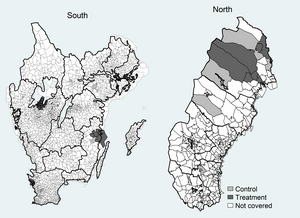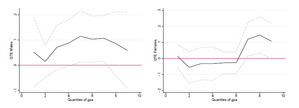Early-life conditions and later-life outcomes
Early-life conditions and later-life outcomes
A growing literature analyses the so-called Barker or fetal origins hypothesis, according to which external conditions during pregnancy and early childhood can have far-reaching consequences later in life. One of the major supporters and name giver of this hypothesis was David Barker, who stated that the environment of the fetus during the in-utero period and fetal undernutrition can lead to coronary heart disease or obesity in adulthood. Researchers in economics have taken the analysis one step further by investigating whether in-utero and early life conditions have effects on a variety of other health- and socioeconomic outcomes.
Research:
This research project aims at evaluating the effects of an ante- and neonatal care programme on children’s health and socioeconomic outcomes later in life. The intervention was pioneered in Sweden in 1931–1933, and appears to have been pivotal in the emergence of universal infant care programmes in the Scandinavian countries during the creation of the Welfare State. It offered free ante- and neonatal care to mothers and infants of 7 quasi randomly chosen health districts. Services included guidance and examinations at the surgeries, home visits and information campaigns.
Figure 1: Treatment and Control Regions (Bhalotra et al., 2018).
This natural experiment allows us to draw clear conclusions regarding the effectiveness of ante- and neonatal care programmes since we can estimate causal effects instead of simple correlations. Exploiting regional and time variation in the implementation of the programme, we employed difference-in-differences estimators to study the effects on mortality, health, educational attainment and socio-economic outcomes later in life.
The main aim of the intervention was to improve survival rates and health of expectant mothers and their children. We therefore explored the effects of the field trial on mortality in a first step (cf. Bhalotra et al., 2017). We estimate that the average duration of programme exposure in infancy led to a 1.56% point decline in the risk of infant death (24% of baseline risk) and a 2.56% point decline in the risk of dying by age 75 (7.0% of baseline risk). We directly identify intervention-led declines in the risk of dying after the age of 50, dominated by reductions in cancer and cardiovascular mortality. We find no evidence of selective utilisation, and the estimates are similar when we exploit within-mother variation in outcomes.
Table 1: Infant and Future Survival Chances (Bhalotra et al., 2017).
In the second part of the project (cf. Bhalotra et al., 2018) we measure impacts on childhood health and cognitive skills at ages 7 and 10, educational choice during young adulthood, employment, earnings and occupation at age 36-40, and pension income at age 71. We estimate that exposure was associated with substantial increases in earnings and (public sector) employment among women, alongside no improvements for men. This appears to be related to the intervention having made it more likely that primary school test scores for girls were in the top quintile of the distribution and, related, that they attended secondary school. The greater investments of women in education are consistent with their comparative advantage in cognitive tasks, but opportunities are also likely to have played a role.
Figure 2: Quantile regression: GPA in grade 4 by gender (Bhalotra et al., 2018).
Cooperations and funding:
The project is funded by a grant from the Swedish foundation Riksbankens Jubileumsfond and is carried out in collaboration with Sonia Bhalotra (University of Essex) and Therese Nilsson (Lund University)
Publications and working papers:
Bhalotra, Sonia & Karlsson, Martin & Nilsson, Therese, 2017. Infant Health and Longevity. Evidence from a Historical Trial in Sweden. Journal of the European Economic Association, Volume 15, Issue 5, 1 October 2017, Pages 1101–1157. Link
Bhalotra, Sonia & Karlsson, Martin & Nilsson, Therese & Schwarz, Nina, 2018. Infant Health, Cognitive Performance and Earnings: Evidence from Inception of the Welfare State in Sweden. HEDG Health, Econometrics and Data Group WP 18/06. Link
Andreella, Claudia & Karlsson, Martin & Nilsson, Therese & Westphal, Matthias, 2016. The Long Shadows of Past Insults: Intergenerational Transmission of Health over 130 Years. Working Paper Series 1125, Research Institute of Industrial Economics. Link
Other relevant links:
https://www.uni-due.de/de/presse/meldung.php?id=9621<u> </u>


